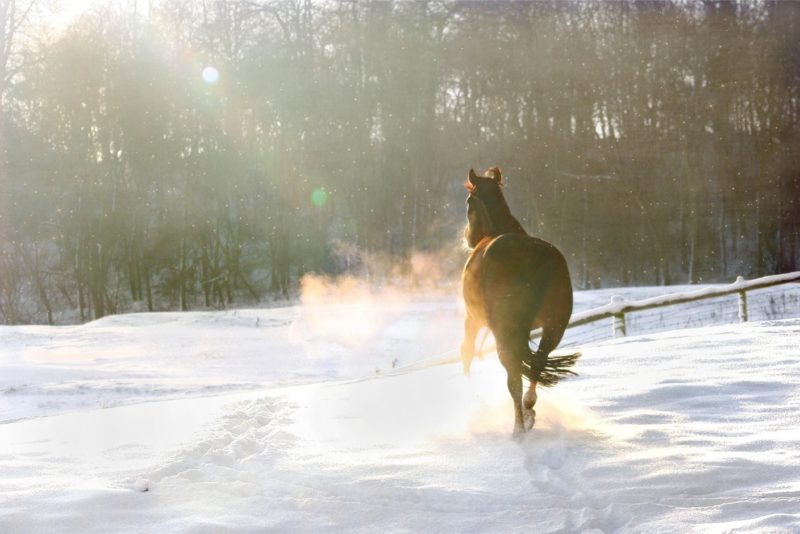Although horses are very adaptable to cold weather, they are generally managed very sensibly during the winter. Maintaining your equine athletes muscle health is important all year round for top performance and overall physical health and well-being. Throughout the year many factors including weather and temperature are changing and could possibly be impacting muscle health. Cold weather, especially when its extreme, can decrease not only skin temperature but also muscle temperature.
 Fact:
Fact: Research has proven that exposure to cold causes increased stiffness in both muscle and connective tissue, including tendons and ligaments.
During exercise in the cold, your horses’ muscles require more energy at a faster rate for them to function compared to what they would require under less extreme conditions. Cold muscles are less elastic and don’t absorb shock or impact as well as warm muscles, and they are also less responsive to signals from the nervous system so movements are less coordinated.
Warming Up In Winter:
Warm ups are very important: include longer bouts of walking before exercise in cold weather to enhance blood flow through the muscles when starting. Blood flow increases muscle temperature and oxygenation of the muscle cell, facilitating muscle function. Walking as a warm up can be done in hand, on a lunge line, or by using a treadmill or a horse walker. As a next step in a warmup you can increase the speed of movement by trotting. Trotting increases the stretch of the connective tissue and recruits more muscle fibers into work. After exercise is finished, the cooldown should be a mirror image of the warmup.
Nutrition:
In cold weather, horses utilize feed to stay warm over both the short and long term. Within minutes of eating a meal, the horse's digestive processes start to generate body heat. And over the long term, the calories that are not immediately converted to energy that supports bodily processes are stored as fat, which helps to insulate against the cold. As pastures begin to provide less forage and grass loses some of its nutritional quality in the colder months, horse owners should plan to supplement with another forage source such as hay, cubes or a complete pelleted feed. Preconditioning horses before the onset of cold temperatures helps to reduce the effect of cold weather on nutritional needs.
Here are some tips to keep your horse comfortable during winter:
- Feed a joint supplement
- Maintain flexibility
- Groom with a rubber massager
- Encourage natural movement
- Try to maintain regular exercise schedule
- Keep them hydrated
- Allow “grazing” with good quality hay
Although a full winter coat will protect most horses well enough in subzero temps, blankets can be integral part of maintaining a horse’s health during winter months. The BeneFab
Therapeutic Quarter Sheet is a unique quarter sheet that can be used with or without stirrups and also doubles as a throw or body wrap for yourself – the best of both worlds.
It’s made up of a power bio ceramic thread that helps reduce recovery time, promote blood circulation and increase oxygen flow. The ceramic materials emit FAR-infrared rays that keep muscles, joints, tendons, and ligaments soft and relaxed.
 Fact: Research has proven that exposure to cold causes increased stiffness in both muscle and connective tissue, including tendons and ligaments.
During exercise in the cold, your horses’ muscles require more energy at a faster rate for them to function compared to what they would require under less extreme conditions. Cold muscles are less elastic and don’t absorb shock or impact as well as warm muscles, and they are also less responsive to signals from the nervous system so movements are less coordinated.
Fact: Research has proven that exposure to cold causes increased stiffness in both muscle and connective tissue, including tendons and ligaments.
During exercise in the cold, your horses’ muscles require more energy at a faster rate for them to function compared to what they would require under less extreme conditions. Cold muscles are less elastic and don’t absorb shock or impact as well as warm muscles, and they are also less responsive to signals from the nervous system so movements are less coordinated.






















